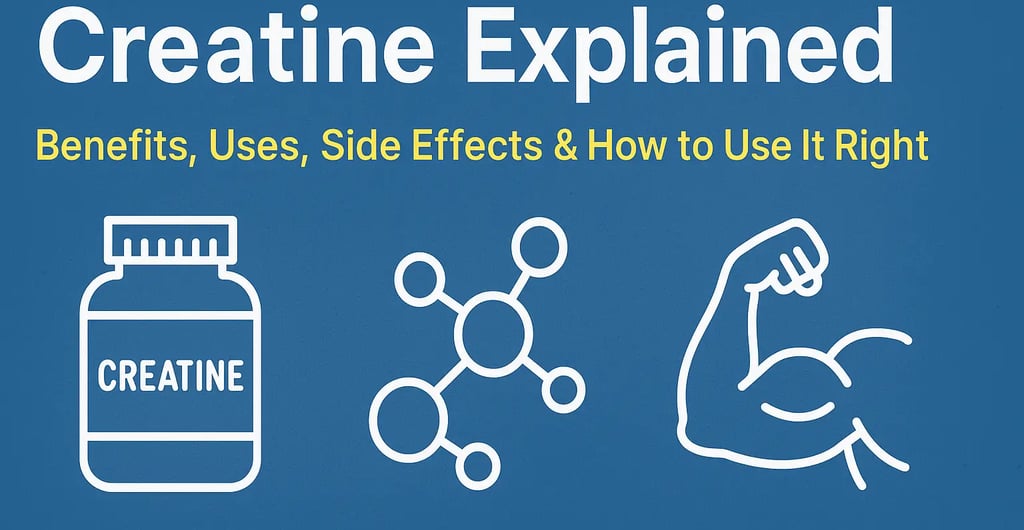What Is Creatine? Benefits, Uses, Side Effects & Best Practices
Discover what is creatine, how it works, its benefits for fitness and brain health, potential side effects, and how to use it effectively for optimal results.


Creatine Explained: Benefits, Uses, Side Effects & How to Use It Right
What is Creatine and How Does It Work?
Creatine is a naturally occurring compound synthesized in the body from the amino acids arginine, glycine, and methionine. It is also found in dietary sources like red meat and fish. Most of the creatine in the human body is stored in muscle cells, where it plays a crucial role in energy production.
Creatine helps regenerate adenosine triphosphate (ATP), the body’s main energy molecule, especially during short bursts of high-intensity activity such as sprinting or weightlifting. It does this by donating a phosphate group to adenosine diphosphate (ADP), converting it back into ATP and allowing muscles to continue contracting effectively.
This quick energy replenishment is what makes creatine so valuable for improving performance, increasing strength, and aiding muscle recovery during intense physical activities.
Types of Creatine Supplements
Several forms of creatine are available, each offering different advantages:
Creatine Monohydrate: The most researched and widely used form. Known for increasing muscle mass, strength, and performance.
Creatine Ethyl Ester: Marketed for improved absorption.
Buffered Creatine: Designed to reduce stomach discomfort in sensitive users.
While their absorption rates may vary, all types primarily serve the same function—supporting ATP regeneration for better performance.
Uses of Creatine in Sports, Fitness, and Beyond
Creatine is a staple supplement for athletes, bodybuilders, and fitness enthusiasts due to its proven benefits in enhancing strength, power output, and endurance.
Athletic Performance and Muscle Gains
For athletes involved in resistance training or high-intensity sports, creatine helps:
Improve workout capacity and volume
Boost strength and power
Increase lean muscle mass over time
Enhance recovery by reducing muscle soreness
Endurance and Stamina
While best known for short-duration efforts, creatine may also benefit endurance athletes by enhancing overall training output.
Cognitive Benefits
Emerging research shows creatine may support cognitive function, especially under mental stress or sleep deprivation. This makes it useful not only in physical activities but also in mentally demanding tasks.
Potential Medical Applications
Studies are investigating creatine’s role in managing neurological and neuromuscular disorders such as Parkinson’s disease, ALS, and muscular dystrophy.
Potential Side Effects and Safety Concerns
Creatine is generally safe for healthy individuals when used as directed. However, some users may experience:
Gastrointestinal discomfort (e.g., cramps, bloating, nausea): Start with a lower dose and gradually increase.
Dehydration risk: Since creatine pulls water into muscle cells, maintaining hydration is essential.
Muscle cramping: Often a result of inadequate hydration or electrolyte imbalance—not creatine itself.
Kidney Health Concerns
A common myth is that creatine damages kidneys. However, studies show no adverse effects on kidney function in healthy individuals. Still, those with existing kidney issues should consult a healthcare provider before starting supplementation.
Best Practices for Taking Creatine
To get the most out of creatine supplementation:
1. Choose the Right Form
Opt for creatine monohydrate, which is effective, affordable, and well-studied.
Look for third-party-tested supplements to ensure purity and quality.
2. Follow a Proven Dosing Strategy
Loading Phase: 20 grams daily (4 doses of 5g) for 5–7 days.
Maintenance Phase: 3–5 grams daily thereafter.
3. Timing
Take creatine before or after workouts for best results.
Pair it with a carbohydrate/protein mix to enhance absorption.
4. Stay Hydrated
Drink plenty of water throughout the day.
Monitor hydration especially during intense workouts.
5. Combine With a Balanced Diet
Support creatine’s effects with adequate protein, carbs, and micronutrients to promote recovery and growth.
6. Consult a Healthcare Provider
Especially important for those with medical conditions, pregnant or nursing women, or individuals on medication.
Conclusion
Creatine is one of the most effective, well-researched supplements for enhancing performance, building muscle, and possibly supporting cognitive function. With proper usage, quality sourcing, and adherence to best practices, creatine can be a powerful addition to both athletic and general health routines.
